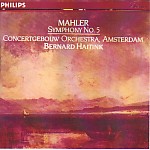This disc is more valuable as a memento of just how characterful the Concertgebouw sounded in the 1960s and ’70s rather than as a particularly distinctive Mahler Fifth. The excellent winds, narrow-toned trombones, vibrato-laden trumpets, wonderfully disciplined strings, and crisp but odd percussion (brittle cymbals and a tam-tam that sounds fabulous in piano passages but is inaudible the rest of the time) created a unique sonority that has largely disappeared despite the ensemble’s ongoing high standard of performance. Haitink’s pacing is pretty much spot-on, save for a scherzo that bogs down a bit from time to time–but with climaxes in that movement, the second movement, and the finale that never achieve the necessary impact, and with engineering that precedes Philips’ learning how to record bass frequencies in the Concertgebouw, you’re only going to want this “on-demand” production from Arkivmusic.com if you’ve been collecting Haitink’s first Mahler cycle individually and you need the Fifth. It never was one of his more compelling Mahler performances; not here, not in his Berlin remake, and the passage of time has changed nothing.
































